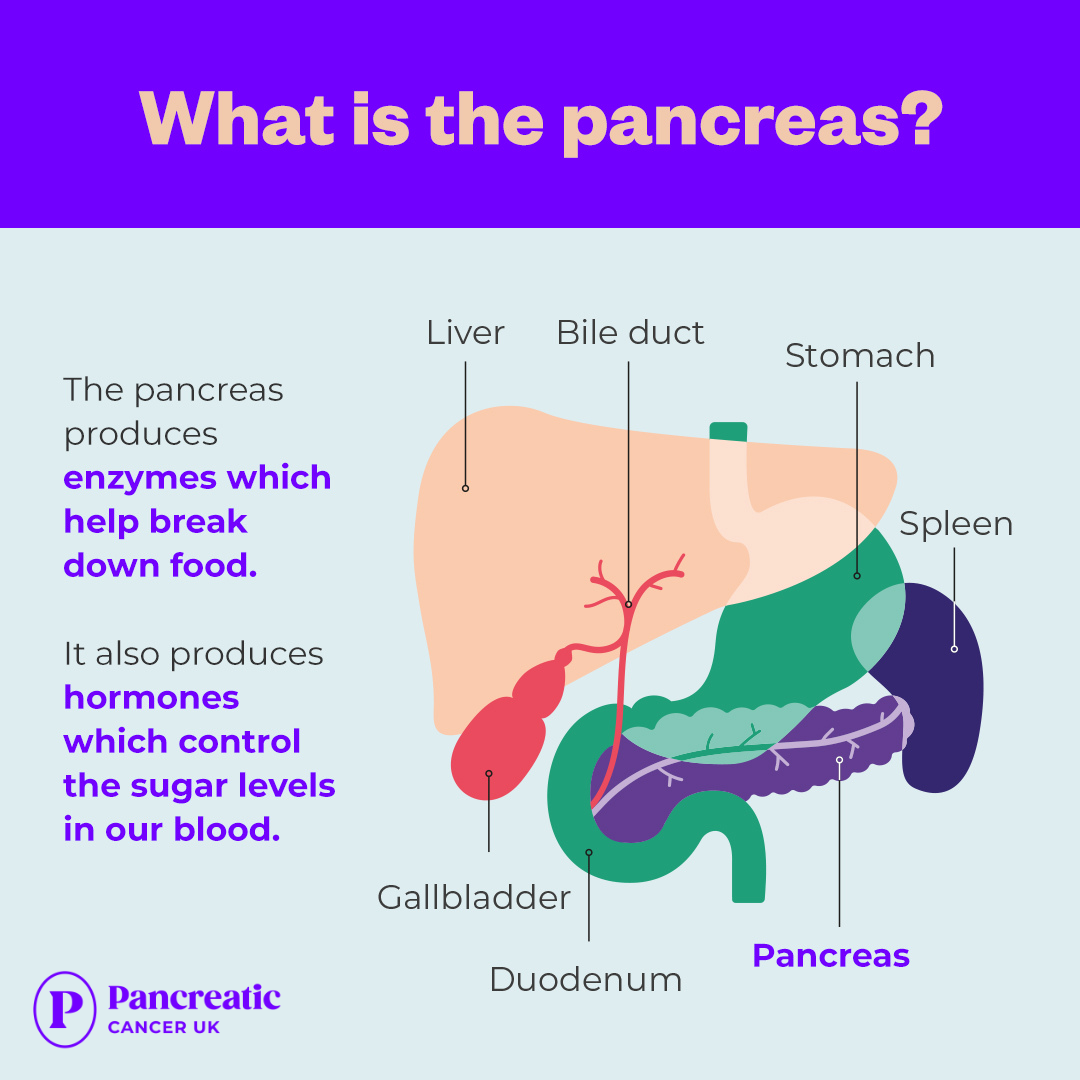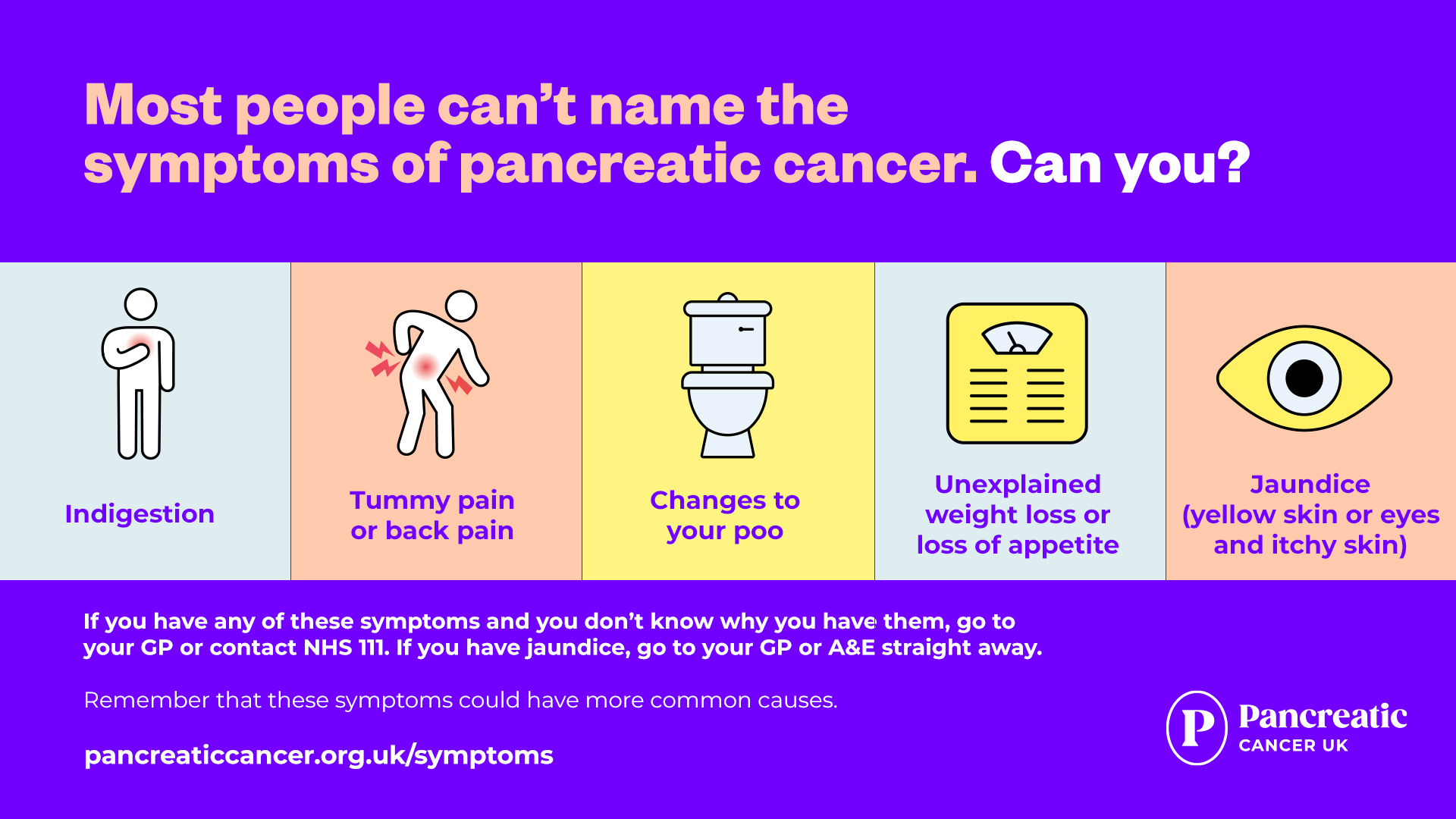
Pancreatic cancer can be difficult to diagnose because symptoms may be mistaken for other things. Sadly, and shockingly, more than half of individuals with pancreatic cancer die within 3 months of diagnosis, and the five year survival rates are the lowest of all the cancer types. Despite this, only a tiny percentage of the annual UK cancer research budget goes into pancreatic cancer, something that Pancreatic Cancer UK is working hard to change.
November is Pancreatic Cancer Awareness Month, so this article is bringing attention to one of the most challenging and life limiting cancers out there. We need to raise awareness of the signs and symptoms of pancreatic cancer and, where possible, support organisations funding research.
What Does The Pancreas Do?
The pancreas is a key part of our digestive system. It produces digestive enzymes which help to break down the food we eat, so that we can absorb the nutrition our food provides. It also produces the hormone insulin which controls our blood sugar levels by taking glucose out of the blood stream and into the body to be used as energy.

Pancreatic cancer can develop in any part of the pancreas, and the nutritional management will vary according to which part of the pancreatic function is affected.
Know The Symptoms
Knowing the symptoms can be life-saving because early treatment with surgery, chemotherapy and possibly radiation therapy can be effective. Because these symptoms can be mistaken for other things, it’s important to know what’s normal for you, and seek advice if you experience any changes.
Indigestion
Indigestion can present in different ways, and can cause stomach pain or discomfort, fullness after eating, bloating, belching, nausea, heartburn, acid reflux and loud abdominal gurgling noises.
Tummy Pain or Back Pain
Persistent pain in the upper abdomen or back that worsens after eating or while laying down.
Changes to Your Poo
Looking at your poo is important! Pale, grey or white stools that are oily/greasy, or visible oil in the water when you poo can be a sign that your body is not absorbing your fat; an indicator that your pancreas is struggling to produce enough digestive enzymes. Sometimes these stools are difficult to flush and are loose in consistency.
Unexplained Weight Loss or Loss of Appetite
Rapid weight loss could be a sign your digestive system is not absorbing nutrition due to a lack of pancreatic enzymes. This is definitely a red flag.
Jaundice
Jaundice is the yellowing of the skin or eyes. Often this comes with dark urine (wee) and some people may experience itchy skin. This can be because a bile duct is blocked leading to a build up of something called bilirubin.
New-Onset Diabetes
A sudden diagnosis of diabetes without other risk factors could be a sign of pancreatic changes.

How A Dietitian Supports Someone With Pancreatic Cancer
Alongside medical cancer treatments, working with a cancer specialist dietitian is absolutely key, since there are huge nutritional implications with this type of digestive system cancer.
We provide pancreatic enzyme replacement therapy (PERT) guidance including why this medication is necessary, how much to take, and when to take it (often doctors aren’t armed with this precise knowledge). Without this medication, nutrient absorption is reduced which will lead to fast weight loss and malnutrition.
Dietitians also support clients in what sort of foods to eat to maintain their nutritional status to support energy levels and quality of life.
For those with diabetes, dietitians will work with a diabetes nursing team to help monitor blood sugar levels and suggest dietary modifications to help maintain stable energy and diabetes-related symptoms.
Cancer specialist dietitians also work with patients to address any digestive symptoms and side effects from treatment, working closely with the oncology team.
Green Light Nutrition are Specialists in Supporting Pancreatic Cancer
If you’re worried about any symptoms or want more information on managing digestive health, our clinic team is here to help. We offer personalised online consultations to guide you in managing symptoms, supporting digestion, and navigating any emotional challenges that come with a diagnosis of pancreatic cancer. Reach out to us today to learn how we can support you or your loved one on this journey.
Spread The Word
Awareness of pancreatic cancer can be life-changing. Be aware of the symptoms, and talk to friends and family about the signs to watch out for. Share resources on social media, and on November 21st, wear something purple to pay tribute to those personally affected as well as raising awareness of this terrible disease.